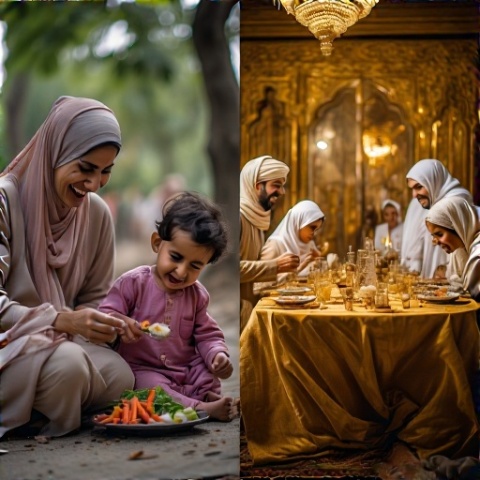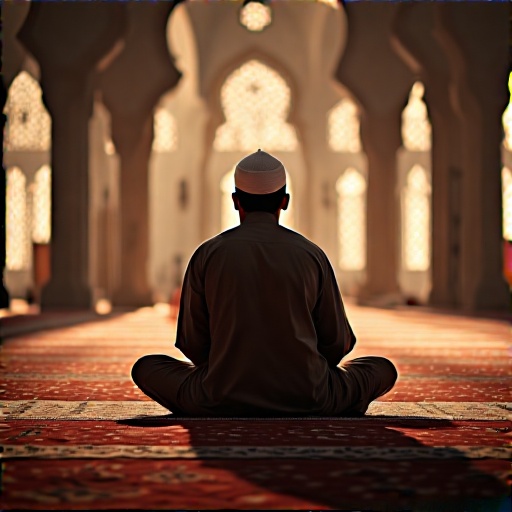In an age obsessed with luxury cars, designer wardrobes, and social media validation, Islam’s revolutionary teachings about wealth and poverty strike at the heart of societal norms. The life of Prophet Muhammad (PBUH) and his companions (RA) presents a radical alternative to materialistic success—a paradigm where poverty becomes a pathway to divine elevation, and worldly wealth risks becoming a spiritual liability. This contrast between temporal riches and eternal success forms the cornerstone of Islamic economics, ethics, and spirituality.
Allah (SWT) declares in the Quran:
“The example of [this] worldly life is but like rain which We have sent down from the sky that the plants of the earth absorb—those from which men and livestock eat—until when the earth has taken on its adornment and is beautified, and its people suppose that they have capability over it, there comes to it Our command by night or by day, and We make it a harvest [as if] it had not flourished yesterday. Thus do We explain in detail the signs for a people who reflect.” (Quran 10:24)
This verse encapsulates the transient nature of worldly wealth—a reality embodied by the Prophet (PBUH) and his companions (RA), who prioritized eternal success over temporary comforts. Their lives offer timeless lessons for Muslims navigating today’s consumerist societies.
The Prophet’s Life of Simplicity: A Divine Blueprint
Personal Belongings: Less Than a Traveler’s Pack
Historical records paint a vivid picture of the Prophet’s (PBUH) austere lifestyle. At the time of his passing, he left behind no inheritance of gold, silver, or property.
Lady Aisha (RA) reported:
“When the Prophet (PBUH) died, he did not leave behind a dinar, dirham, sheep, or camel. He made no will.” (Sahih Bukhari 3093, Sahih Muslim 1757). This radical simplicity extended to his daily life.
His wife Aisha (RA) described their household:
“We would sight three crescent moons in two months without lighting a fire for cooking. Our sustenance was dates and water, except for the milk neighbors occasionally gifted us.” (Sahih Bukhari 6459)
Rejecting Royal Privileges: The Choice of Poverty
Despite opportunities to live comfortably, the Prophet (PBUH) consciously embraced simplicity. When offered luxurious furnishings, he declined, stating:
“What have I to do with worldly comforts? My likeness and this world’s is that of a traveler who rests under a tree’s shade, then leaves it behind.” (Sunan Ibn Majah 4109)
His straw mattress left marks on his skin, prompting Umar (RA) to weep. The Prophet (PBUH) reassured him:
“Does it not please you that luxury is theirs in this world, and the Hereafter is ours?” (Sahih Muslim 1479)
The Companions’ Poverty: Trials Leading to Triumph
Early Muslims: Wealth Redefined
The Muhajirun (emigrants from Mecca) abandoned prosperous businesses for faith. Allah (SWT) honored these sacrifices:
“And [He will grant] favor and bounty. They are not equal to those who spent after the fighting and struggled. But to each, Allah has promised the best reward.” (Quran 57:10)
Divine Exchange: Trading Wealth for Honor
The companions’ poverty became their spiritual wealth. Abu Hurairah (RA), who often fainted from hunger, became one of Islam’s most prolific Hadith narrators. The Quran immortalizes their state:
“[They are] the poor emigrants who were expelled from their homes and properties, seeking bounty from Allah and [His] approval.” (Quran 59:8)
Contrast this with Abu Lahab, the Prophet’s wealthy uncle, condemned in Surah Al-Masad for opposing Islam. His riches brought neither honor nor salvation.
Divine Elevation Beyond Material Measures
The Currency of the Hereafter
Allah (SWT) established an inverse relationship between worldly wealth and true success:
“But you prefer the worldly life, while the Hereafter is better and more enduring.” (Quran 87:16-17)
The wealthy Quraysh leaders mocked early Muslims’ poverty. Yet, history witnessed their humiliation at Badr, while the “poor” Muslims triumphed. This pattern continues: modern billionaires chase fleeting fame, while unknown believers build eternal rewards through night prayers and charity.
The Honor of Neediness
The Prophet (PBUH) taught:
“The poor Muslims will enter Paradise half a day—500 years—before the rich.” (Sunan Ibn Majah 4122)
This “half day” represents the spiritual lead gained through patience in poverty and avoidance of wealth’s distractions.
Contemporary Relevance: Resisting Greed in the Digital Age
The Social Media Mirage
Platforms like Instagram glorify lavish lifestyles, breeding discontent. The Prophet (PBUH) advised:
“Look at those below you in wealth, not those above. This prevents belittling Allah’s blessings.” (Sahih Muslim 2963)
Practical application:
- Curate feeds to include content on simplicity (e.g., minimalism accounts)
- Share stories of the Prophet’s (PBUH) lifestyle to counter consumerist narratives
Zakat: The Antidote to Hoarding
Modern Muslims must revive the companion’s generosity. Uthman (RA) funded entire armies, while Abu Bakr (RA) donated all his wealth. Today, this translates to:
- Automating Zakat payments
- Sponsoring orphan educations via reliable charities
- Supporting interest-free microfinance projects
Cultivating Contentment: A Step-by-Step Sunnah Approach
- The 24-Hour Test
Before purchases, ask: “Will this benefit me in the Hereafter?” Delay non-essential buys for 24 hours. - Gratitude Journaling
Document three daily blessings, following the Quranic command:
“If you tried to count Allah’s blessings, you could never number them.” (Quran 14:34)
- Sadaqah Challenges
Compete with friends to donate “hidden charity”—helping without announcing it.
Answering Common Questions
Q: How can I balance earning halal income with contentment?
A: The Prophet (PBUH) said:
“The best earnings are from honest trade.” (Sahih Bukhari 2082)
Islam encourages seeking provision but cautions against making wealth the ultimate goal. Set income thresholds—once needs are met, focus on charitable investments.
Q: What if I face financial hardship despite working hard?
A: The companions faced severe poverty yet became Islam’s greatest heroes. Allah (SWT) assures:
“Indeed, the patient will be given their reward without account.” (Quran 39:10)
Document your struggles as “sadaqah journals”—future generations will treasure these faith stories.
Conclusion: Embracing the Prophetic Poverty
The Prophet (PBUH) left no material inheritance but focused a treasure far greater—the Quran and Sunnah. In Turkey’s Topkapi Palace, his simple sandal and patched cloak draw millions, while the palaces of his wealthy opponents lie forgotten. This encapsulates Islam’s eternal truth: true wealth lies in Allah’s pleasure, not bank accounts.
Let us conclude with the Prophet’s (PBUH) supplication:
“O Allah, make me content with what You’ve provided me. Bless it for me, and replace what I’ve lost with something better.” (Sahih Muslim 2738)
May we emulate those who entered history poor yet left as kings of the Hereafter. Their legacy challenges us: Will we trade temporary glitter for eternal light?







